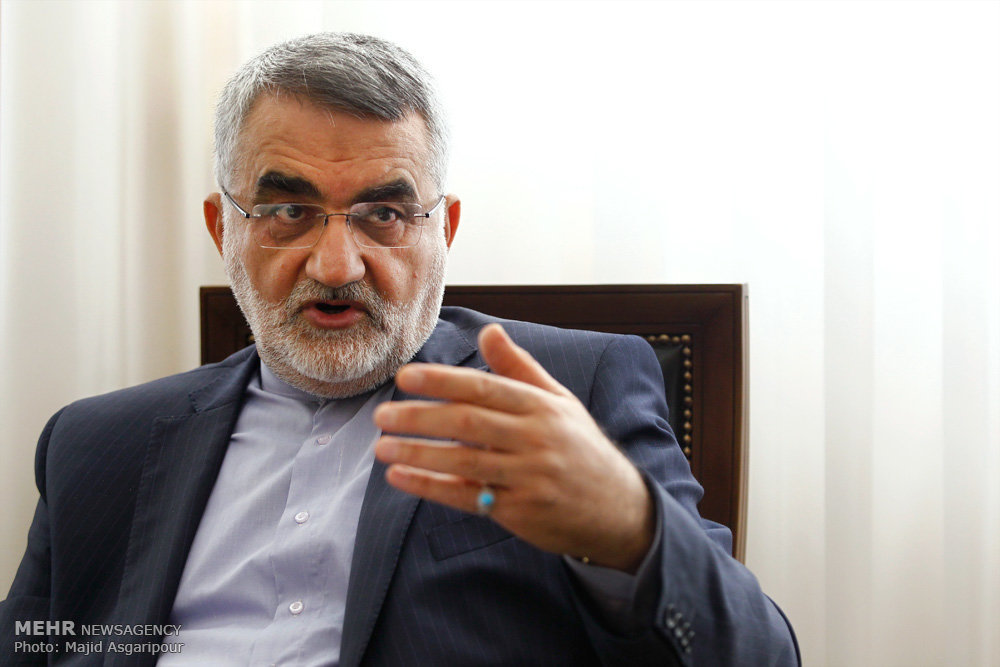Iran: Russian use of air base authorized by top security body

TEHRAN – One day after Russia announced it was using the Hamadan air base in western Iran to pound Daesh and al-Nusra Front strongholds in Syria, a senior lawmaker said the Supreme National Security Council (SNSC) had approved the deployment, supplying fuel to the Russian jets.
“Flying Russian jets from the Nojeh air base (in Hamadan) is in compliance with the Supreme National Security Council’s ratification and within the quadrilateral cooperation framework among Iran, Russia, Iraq, and Syria,” said Alaeddin Boroujerdi said, head of the parliamentary committee for national security and foreign policy.
He also stressed that Iran only provides fueling services to the Russian squadron in the Iranian airbase and this is in line with the anti-terrorism cooperation between the two countries.
On Tuesday, the Russian Defense Ministry announced that its Tu-22M3 long-range bombers and Su-34 tactical bombers were launching sorties over Syria from the Hamadan air base. Read more at http://www.tehrantimes.com/news/405424/Russia-uses-Iranian-airbase-to-launch-airstrikes-on-Daesh-in.
The statement said, “On August 16, 2016, Tu-22M3 long-range bombers and Su-34 tactical bombers took off from the “Hamedan” airbase (the Islamic Republic of Iran) and carried out a concentrated airstrike on objects of the ISIS and Jabhat al-Nusra terrorist groupings in the provinces of Aleppo, Deir ez-Zor and Idlib.”
Boroujerdi made the case that the deployment contributes to counterterrorism attempts in the region.
Other Iranian“The approach toward the East does necessitate some components, including having strategic relations with countries such as Russia and China,” Ali Abar Velayati noted. officials, including SNSC Secretary Ali Shamkhani, have backed the decision, seeing it as an indication of a strategic alliance between Tehran and Moscow.
Iran and Russia “enjoy strategic cooperation in the fight against terrorism in Syria, and share their facilities and capacities to this end,” Shamkhani noted.
Former Iranian foreign minister Ali Akbar Velayati also deemed the military synergy as the beginning of a new approach to the Eastern bloc by Tehran. “Having strategic relations necessitates cooperation such as counterterrorism attempts,” said Velayati, who currently acts the top advisor to the Leader.
“The approach to the East does necessitate some components, including having strategic relations with countries such as Russia and China,” explained Velayati.
“Over the past months, Iran and Russia have made a number of arrangements to stand up to the invasion (against Syria). The recent defensive cooperation is in line with the arrangements…. Therefore, Iran’s approach to Russia is strategic and all-encompassing,” he stated.
Iran had already opened its airspace to Russian fighters as well as missiles fired from its Caspian Sea flotilla in October 2015, when four Russian warships launched a total of 26 Kalibr cruise missiles from the Caspian Sea, training on target in Syria.
This is, however, the first time Iran is cooperating with Russia in such capacity, acting as a springboard for the Russian air force to operate more efficiently in its war on terrorism.
Iran and Russia have been assisting the Syrian government in fight against the foreign-backed militancy which has been holding swathes of territory in the country as well as in Iraq.
Parliament Speaker Ali Larijani says, “Under Article 146 of the Constitution, the establishment of any foreign military base inside the country is forbidden, and it is worth mentioning that Iran has not given such a base to any country.” The Iranian Constitution and the air base deployment
While some Iranian officials have strongly backed the new addition to already strong Russian-Iranian bonds, some others have come to censure it, seeing it in breach of the Iranian Constitution.
“The deployment of Russian jets in the Martyr Nojeh air base should be considered in the light of Article 146 of the Constitution…,” said Heshmatollah Falahatpisheh, a member of the national security committee of the parliament.
Under the article, no foreign army is allowed deployment in the Iranian soil even for peaceful purposes.
However, an amendment to the principle gives the leeway to the SNSC to act differently just in case.
“The foreign policy of Russia is widely turbulent and at times, full of fluctuations,” the parliamentarian said, questioning trustworthiness of the country.
The objection drew an explanation from Iranian Majlis Speaker Ali Larijani.
“Under Article 146 of the Constitution, the establishment of any foreign military base inside the country is forbidden, and it is worth mentioning that Iran has not given such a base to any country,” Larijani stated.
The difference has to do more with different possible interpretations of the constitutional principle, which distinguishes deployment from establishment.
While it allows no permanent or temporary establishment of military bases in the Iranian territory, it allows for deployment of foreign forces depending on approval of the SNSC.
Larijani further said Iran is cooperating militarily with Russia as an ally in the Middle East and this does not mean that Iran is giving Russia a military base.
“Iran has cooperation with Russia because of a terrorist crisis which has been created by the U.S. and some regional countries.”
"Our cooperating with Russia on regional issues such as Syria does not mean that we have given a military base to Russia," Larijani remarked.
NA/AK/PA
Leave a Comment